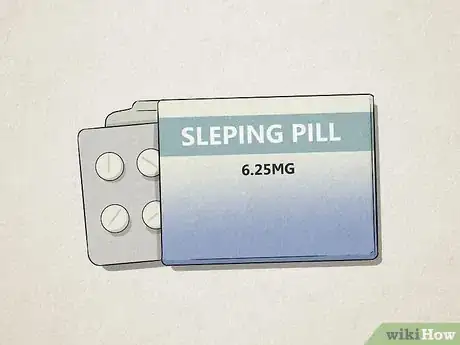This article was co-authored by Greg Guiteras and by wikiHow staff writer, Madeleine Criglow. Greg Guiteras is the CEO of Lorraine Travel, LLC, one of the largest privately-owned travel management companies in Florida founded in 1948. With over 34 years of experience, Greg's specialties are in corporate travel management, sales and marketing, contract negotiations, strategic partnerships, and luxury hotel sales. Greg holds a BS in Marketing from Florida State University. Greg has also created WhataHotel!, a website offering exclusive perks on hotel bookings, and CabinMate, an app that matches single cruise travelers with potential cabin matches "in the same boat" to avoid traveling solo on a cruise.
There are 11 references cited in this article, which can be found at the bottom of the page.
This article has been viewed 16,381 times.
No one likes to deal with jet lag, but it can be hard to avoid if you have to travel. If you're dealing with some frustrating jet lag symptoms, you may be wondering how long they will last. Luckily, this article has the answer to that question and many more. Keep reading so that you can start to feel great again after travelling to another time zone.
Steps
How can I get rid of jet lag fast?
-
1Adjust your sleep schedule to the new time zone as soon as possible. If you traveled to a city that's 8 hours ahead, for example, your body may want to go to bed when everyone else is just waking up. Do your best to push through and stay up so that you can sleep well that night.[9]
- If you're really struggling, try drinking a cup of coffee or caffeinated tea to stay alert.[10]
-
2Keep yourself hydrated. The dry air in an airplane cabin can make you dehydrated, which can worsen your jet lag symptoms. When you're traveling, try to drink between 11.5 cups (2.7 L) and 15.5 cups (3.7 L) of water a day.[11]
- Avoid alcohol and limit your caffeine since both can cause dehydration.[12]
-
3Go outside and enjoy a little sunlight. Your body's circadian rhythm is influenced by light. To help your body adjust to a time zone that's later than yours (i.e. when you travel westward), stay in the sunlight into the evening. If you're traveling eastward and want to get used to an earlier time zone, open your blinds and let in the morning light.[13]
- If you travel across more than 8 time zones, your body might confuse morning light with dusk and evening light with morning light. In that case, limit your light exposure in the mornings for the first few days using sunglasses and then stay out in the sunlight during the afternoon.
What medication can I take for jet lag?
-
1Melatonin is a supplement that can help you fall asleep. Your body naturally produces this hormone in the evening to help you fall asleep. To make sleeping according to another time zone easier, you can take melatonin as a supplement.[14] On the day that you get to your destination, take between 0.5 and 3 mg of melatonin after dark.[15] If it helps, keep taking the same dosage after dark for 2-3 days to help get your body used to your new sleep schedule.[16]
- Consult your doctor before taking melatonin if you have epilepsy or if you're currently taking the medication warfarin.
- Avoid taking too much melatonin! The supplement comes in doses of up to 10 mg and higher, but doctors advise sticking to the 0.5 and 3 mg range. Otherwise, you may feel groggy and have a hard time concentrating the next day.[17]
-
2Sleeping pills can help you fall asleep and manage chronic insomnia. Studies show that sleeping pills like zolpidem (Ambien) and eszopiclone (Lunesta) can ease jet lag symptoms. Since these are stronger medications, you'll need a prescription to use them. Make an appointment with your doctor and ask if sleeping pills would be a good option for you. If they are, your doctor will write a prescription with a specific dosage recommendation.[18]
- Side effects of sleeping pills include dizziness, headaches, an upset stomach, and confusion.
References
- ↑ https://www.uofmhealth.org/health-library/ug4997
- ↑ https://www.mayoclinic.org/diseases-conditions/jet-lag/symptoms-causes/syc-20374027
- ↑ https://www.ncbi.nlm.nih.gov/pmc/articles/PMC2829880/
- ↑ https://www.mayoclinic.org/diseases-conditions/jet-lag/symptoms-causes/syc-20374027
- ↑ https://www.ncbi.nlm.nih.gov/pmc/articles/PMC2829880/
- ↑ https://www.nhs.uk/conditions/jet-lag/
- ↑ https://www.uofmhealth.org/health-library/ug4997
- ↑ https://www.mayoclinic.org/diseases-conditions/jet-lag/symptoms-causes/syc-20374027
- ↑ Greg Guiteras. Travel Specialist. Expert Interview. 18 September 2020.
- ↑ https://www.ncbi.nlm.nih.gov/pmc/articles/PMC2829880/
- ↑ https://www.mayoclinic.org/healthy-lifestyle/nutrition-and-healthy-eating/in-depth/water/art-20044256
- ↑ https://my.clevelandclinic.org/health/diseases/12781-jet-lag
- ↑ https://www.mayoclinic.org/diseases-conditions/jet-lag/symptoms-causes/syc-20374027
- ↑ Greg Guiteras. Travel Specialist. Expert Interview. 18 September 2020.
- ↑ https://health.clevelandclinic.org/melatonin-how-much-should-i-take-for-a-good-nights-rest/
- ↑ https://www.uofmhealth.org/health-library/ug4997
- ↑ https://health.clevelandclinic.org/melatonin-how-much-should-i-take-for-a-good-nights-rest/
- ↑ https://www.uofmhealth.org/health-library/ug4997
- ↑ https://www.mayoclinic.org/diseases-conditions/jet-lag/symptoms-causes/syc-20374027
- ↑ https://tdtmvjournal.biomedcentral.com/articles/10.1186/s40794-017-0054-0
- ↑ https://time.com/5392876/science-cure-prevent-jet-lag/
- ↑ https://www.ncbi.nlm.nih.gov/pmc/articles/PMC2829880/
- ↑ https://www.mayoclinic.org/diseases-conditions/jet-lag/symptoms-causes/syc-20374027






































































Medical Disclaimer
The content of this article is not intended to be a substitute for professional medical advice, examination, diagnosis, or treatment. You should always contact your doctor or other qualified healthcare professional before starting, changing, or stopping any kind of health treatment.
Read More...